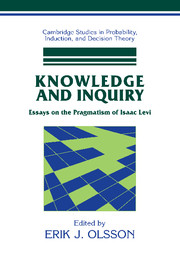Book contents
- Frontmatter
- Contents
- List of Contributors
- Preface
- Introduction: The Pragmatism of Isaac Levi
- 1 Isaac Levi and His Pragmatist Lineage
- 2 Is Pragmatist Truth Irrelevant to Inquiry?
- 3 The Knowledge Business
- 4 Infallibility and Incorrigibility
- 5 Why Inconsistency Is Not Hell: Making Room for Inconsistency in Science
- 6 Levi on Risk
- 7 Vexed Convexity
- 8 Levi's Chances
- 9 Isaac Levi's Potentially Surprising Epistemological Picture
- 10 Isaac Levi on Abduction
- 11 Potential Answers – To What Question?
- 12 Levi and the Lottery
- 13 The Value of Truth and the Value of Information: On Isaac Levi's Epistemology
- 14 Decision-Theoretic Contraction and Sequential Change
- 15 Deciding What You Know
- 16 Levi's Ideals
- 17 The Mind We do Not Change
- 18 Psychoanalysis as Technology
- 19 Levi on Money Pumps and Diachronic Dutch Books
- 20 Levi on the Reality of Dispositions
- 21 Replies
- Index
- References
19 - Levi on Money Pumps and Diachronic Dutch Books
Published online by Cambridge University Press: 05 March 2010
- Frontmatter
- Contents
- List of Contributors
- Preface
- Introduction: The Pragmatism of Isaac Levi
- 1 Isaac Levi and His Pragmatist Lineage
- 2 Is Pragmatist Truth Irrelevant to Inquiry?
- 3 The Knowledge Business
- 4 Infallibility and Incorrigibility
- 5 Why Inconsistency Is Not Hell: Making Room for Inconsistency in Science
- 6 Levi on Risk
- 7 Vexed Convexity
- 8 Levi's Chances
- 9 Isaac Levi's Potentially Surprising Epistemological Picture
- 10 Isaac Levi on Abduction
- 11 Potential Answers – To What Question?
- 12 Levi and the Lottery
- 13 The Value of Truth and the Value of Information: On Isaac Levi's Epistemology
- 14 Decision-Theoretic Contraction and Sequential Change
- 15 Deciding What You Know
- 16 Levi's Ideals
- 17 The Mind We do Not Change
- 18 Psychoanalysis as Technology
- 19 Levi on Money Pumps and Diachronic Dutch Books
- 20 Levi on the Reality of Dispositions
- 21 Replies
- Index
- References
Summary
It is with a great pleasure but also with some misgivings that I contribute to this volume. The pleasure comes from my feelings of friendship and gratitude toward Isaac Levi. We have known each other for a long time now. As I very well recall, it all started way back in the 1970s with his letter commenting on an article of mine dealing with his seminal Gambling with Truth. As a young and shy graduate student in Uppsala, I felt both overwhelmed and overjoyed by this great man's attention and encouragement. Suddenly, the distance between the faraway Columbia and my own university shrank to the manageable size of a philosophical argument. Thanks to Isaac, I realized, for the first time, that it was – perhaps – within my reach to join a larger community of minds that spanned the globe.
The pleasure is mixed with misgivings. Over the years my friendship and affection for Isaac deepened and matured, but philosophically we often found ourselves on opposite sides. He was highly critical of causal decision theory and I was one of its enthusiastic defenders; he was (and still is) a powerful advocate of the thesis that practical deliberation crowds out self-prediction, while I have been one of the doubters. Examples could be multiplied. In this chapter, as it happens, I want to examine another such bone of contention, more precisely the status of diachronic pragmatic arguments. I realize that Isaac may be tired of this ongoing controversy.
- Type
- Chapter
- Information
- Knowledge and InquiryEssays on the Pragmatism of Isaac Levi, pp. 289 - 312Publisher: Cambridge University PressPrint publication year: 2006
References
- 5
- Cited by



